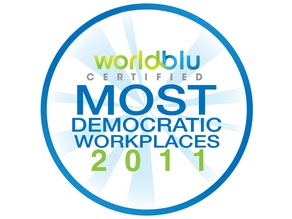The division of labor is the business principle that productivity goes up as tasks are divided up and simplified. The most famous contributor to the science of dividing labor is Henry Ford. By dividing up labor on an assembly line, Ford was able to "democratize the automobile." Since then, every other industry has utilized the principle of "division of labor" to make goods and services more affordable for the majority of Americans.
The benefits of dividing management are just as great as dividing labor; yet, businesses have been slow to change. The greatest advancements in the "division of management" are the franchise and Deming philosophy. By decentralizing ownership to franchise owners, corporations like McDonald's have successfully engaged employees and empowered individuals. Likewise, by doing away with unnecessary layers of management and empowering employees with a purpose beyond profits, Toyota and other Japanese companies found monumental success with W. Edwards Deming's philosophy. Toyota has developed the division of management so well that very little changes when a new CEO comes to power because ultimate authority within the company is not derived by position or rank; following the doctrine of the company, the Toyota Way, is the ultimate source of authority at Toyota.
More and more businesses are copying the successes of companies like McDonald's and Toyota, but we are still far from perfecting the "division of management." We will know that we have arrived when we replace the static org. chart with the idea of a network organization that varies over time, changing to suit the information-processing requirements of varying tasks. Doing so will inspire greater innovation, create more efficiency and productivity, and capture the $300 billion that are lost annually, in the U.S., because of employee disengagement.
How open-book managment, enabling bureaucracy, division of management, participatory ownership, and euphoric purpose are changing the world
Friday, April 15, 2011
Tuesday, April 12, 2011
Most Democratic Workplaces of 2011
New to the list this year are American Support, Bucket Brigade, Bump.com, Greenleaf Book Group, Groupon, Hulu, Integritive, Learn Quebec, Mojo Interactive, Podio, Productivity Associates, Rabbit, Total Debt Freedom, Valtech, Happy at Work, and WD-40.
Other well known companies on WorldBlu's list include Zappos, Guayaki, Great Harvest, DaVita, and 1-800-GOT-JUNK.
Subscribe to:
Posts (Atom)
How Will You Measure Your Life?
I recently read this article by Clayton Christiansen out of Harvard entitled, “How will you measure your life?” It is what he tells his students on the final day of his class.
One of the items that he mentions sticks out to me. It reads as follows:
“One of the theories, . . . . . how to be sure we find happiness in our careers—is from Frederick Herzberg, who asserts that the powerful motivator in our lives isn’t money; it’s the opportunity to learn, grow in responsibilities, contribute to others, and be recognized for achievements. I tell the students about a vision of sorts I had while I was running the company I founded before becoming an academic. In my mind’s eye I saw one of my managers leave for work one morning with a relatively strong level of self-esteem. Then I pictured her driving home to her family 10 hours later, feeling unappreciated, frustrated, underutilized, and demeaned. I imagined how profoundly her lowered self-esteem affected the way she interacted with her children. The vision in my mind then fast-forwarded to another day, when she drove home with greater self-esteem—feeling that she had learned a lot, been recognized for achieving valuable things, and played a significant role in the success of some important initiatives. I then imagined how positively that affected her as a spouse and a parent. My conclusion: Management is the most noble of professions if it’s practiced well. No other occupation offers as many ways to help others learn and grow, take responsibility and be recognized for achievement, and contribute to the success of a team. More and more [people think] that a career in business means buying, selling, and investing in companies. That’s unfortunate. Doing deals doesn’t yield the deep rewards that come from building up people."
I’m sure you can see why it sticks out.
